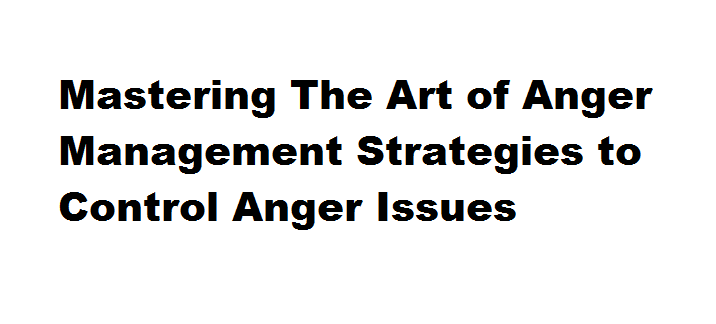Mastering The Art of Anger Management Strategies to Control Anger Issues
3 min read
Introduction
Anger is a natural emotion that everyone experiences, but when it becomes uncontrollable, it can lead to damaging consequences for ourselves and those around us. Learning to control anger issues is crucial for maintaining healthy relationships and personal well-being. In this article, we will explore effective strategies and techniques to manage anger, allowing individuals to develop a greater sense of emotional intelligence and foster healthier communication.
Understanding Anger
Anger is an emotional response triggered by various factors such as frustration, perceived injustice, or a sense of threat. It can manifest in different ways, including verbal outbursts, physical aggression, or passive-aggressive behaviour. Recognizing the signs of anger, such as increased heart rate, tense muscles, and racing thoughts, is the first step in gaining control. Acknowledging and accepting anger as a valid emotion rather than suppressing it is essential. However, it is equally important to learn healthy ways to express and manage this emotion without causing harm.
Identify Triggers
To effectively control anger issues, it is essential to identify the triggers that set off these emotions. Triggers can vary from person to person, but common examples include criticism, feeling disrespected, or experiencing a loss of control. Reflecting on past situations where anger has arisen can help identify recurring patterns and triggers. Once the triggers are recognized, individuals can develop strategies to avoid or cope with them more effectively, reducing the likelihood of anger escalating to uncontrollable levels.
Develop Healthy Coping Mechanisms
When anger arises, it is crucial to have healthy coping mechanisms at hand. Engaging in physical activity, such as going for a walk or practising deep breathing exercises, can help release tension and reduce anger levels. Taking a break from the situation and finding a calm environment to collect thoughts can also be beneficial. Moreover, finding constructive ways to express anger, such as through writing or talking to a trusted friend or therapist, provides an outlet for releasing pent-up emotions.
Effective Communication
Improving communication skills is essential for anger management. Learning how to express feelings and concerns assertively but respectfully can prevent conflicts from escalating. Active listening is equally important, as it allows for better understanding of others’ perspectives. Effective communication techniques, such as using “I” statements, avoiding blame, and seeking compromises, can promote healthier interactions and diffuse potential anger-triggering situations.
Stress Management
Stress can intensify anger, making it more challenging to control. Incorporating stress management techniques into daily routines can significantly reduce anger issues. Activities like practising mindfulness, engaging in hobbies, or adopting relaxation techniques such as meditation or yoga can help manage stress levels. Building a healthy lifestyle that includes regular exercise, adequate sleep, and a balanced diet can also contribute to overall emotional well-being, making anger management more attainable.
Seeking Professional Help
In some cases, anger issues may be deeply rooted or significantly impact an individual’s life and relationships. Seeking professional help, such as therapy or anger management courses, can provide valuable guidance and support. Mental health professionals can help explore underlying causes of anger, develop personalised strategies, and provide tools for long-term anger management success.
FREQUENTLY ASKED QUESTIONS
What Is Anger?
Anger can be defined as a strong feeling of annoyance, displeasure, or hostility. Anger can take many forms both emotionally and physiologically (e.g. sweating palms, “seeing red,” etc.).
What Is the Emotion Behind Anger?
Anger is an emotion itself, but some related or perhaps contributing emotions may include fear (as well as anxiety and worry), sadness, uncertainty or disappointment.
Conclusion
Anger management is a vital skill for leading a fulfilling and balanced life. By understanding and acknowledging anger, identifying triggers, developing healthy coping mechanisms, improving communication, managing stress, and seeking professional help when necessary, individuals can regain control over their anger issues. Remember, managing anger is a journey that requires patience, practice, and self-reflection, but the rewards of healthier relationships and emotional well-being are well worth the effort.
Read Also : 7 Effective Strategies to Reduce Pollution and Protect Our Environment






